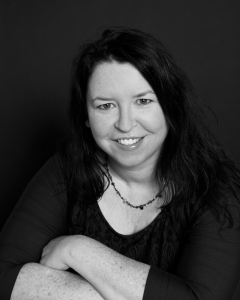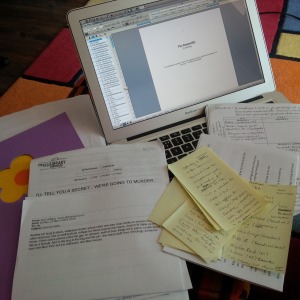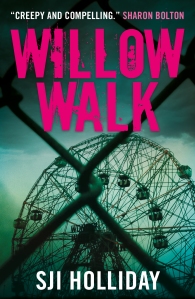Today I’m really pleased to welcome crime author SJI Holliday.
 S.J.I. Holliday grew up in Haddington, East Lothian. She spent many years working in her family’s newsagent and pub before going off to study microbiology and statistics at university. She has worked as a statistician in the pharmaceutical industry for over sixteen years, but it was on a six-month round-the-world-trip that she took with her husband ten years ago that she rediscovered her passion for writing. Her first novel, Black Wood was published in 2015. Willow Walk, the follow-up, was published yesterday, 5th May 2016.
S.J.I. Holliday grew up in Haddington, East Lothian. She spent many years working in her family’s newsagent and pub before going off to study microbiology and statistics at university. She has worked as a statistician in the pharmaceutical industry for over sixteen years, but it was on a six-month round-the-world-trip that she took with her husband ten years ago that she rediscovered her passion for writing. Her first novel, Black Wood was published in 2015. Willow Walk, the follow-up, was published yesterday, 5th May 2016.
When you decide to write something new, what is the first thing you do?
I’m always writing something new. I have new ideas every day. It’s great, as it means I’ll never run out of ideas, but it’s a nightmare trying to stay focused! The first thing I do is think of a title. I can’t work until I have a title! My husband is the titles man, and he usually gets them right first time – I tell him what it’s about, and off he goes. I write an email to myself, with ‘Idea: [title]’ and then I email my first thoughts. I keep adding to this as things occur to me – characters, scenes, snippets of dialogue. Then when I’m ready, I print out the email and get going. Even when I am writing, I am still adding to the notes email – and if new ideas come up, they get their own email from the start, so I can keep adding to them even if I cant write them yet.
Do you have a set routine approaching it?
I didn’t think I did, but it seems that I am doing the same thing each time, without really realising it. I write the notes, then I have a rough idea of the whole thing – including the ending – and I write about 20k. Then I stop and try to work it all out, and at that stage I realise I have to outline it in more detail to keep going – so I write out all the chapter numbers and write a line or two in each one. Then once I have it figured out, I crack on with the writing. Some things will change as I go, and new things will crop up, but the outline keeps me on track and means I can write fast in a short time – I’m still doing a day job so I have to be flexible about when and where I write.
Pen and paper or straight to the keyboard?
Keyboard, and sometimes into my phone – I often write like that on the tube. I have a Blackberry for the sole reason that it has a real keyboard. There’s no way I could write 1000 words on a half hour tube journey with a touchscreen! I occasionally write in a notepad, but I find the transcribing onto the keyboard afterwards a bit tedious. I am hoping to train myself to dictate, but I haven’t managed it yet – it’s a different way of thinking and I haven’t had time to devote to it yet. I do like post-its and scraps of paper for notes though. I am very messy!
How important is research to you?
It’s an excellent procrastination tool! I prefer just to make stuff up. Seriously though, it’s important for certain things. Things that I want to make sure I get right. But I’m not writing a textbook.
How do you go about researching?
I tend to do a fair bit of googling while I am in the notes phase of writing. But when I am writing and I need to know something I write ‘xxx’ then go and fill in the details later. I did speak to a really helpful guy at the Scottish Police College on the phone recently, and I have friends who are ex-police and many others who have various useful day jobs who can usually answer a range of questions.
How do you store everything; ideas, research, images that catch your eye?
My emailed notes are the main source of things, and often I print stuff out then end up scribbling on it. I don’t really use images. I like the idea, but it’s not something I’ve done.
Tell us how that first draft takes shape?
It starts with great enthusiasm, followed by despair, abject misery, a eureka moment and a burst of sheer exhilaration, ending with complete exhaustion. I actually find the first draft the worst part of the process. I enjoy the editing bit, pulling it into shape, and I love plotting. In fact, the ideas bit is the best. I’ve often said I might just publish a book full of ideas and prologues!
Are there any rituals you have to do or items you must have with you while writing that draft?
Nope, nothing at all. I’ll write anywhere, on any device. I’ll eat and drink when I have time. Nothing really has to happen for me to get into the zone. Well, except for being too busy with other things. Then it’s hard.
Does the outside world exist or are you lost to us for a period of time as the magic works?
I usually write in fast bursts, maybe 30-45 minutes at a time. During that time, I am oblivious to everything except my fingers and the keyboard. Then I take a break, stretch, make a drink… then sit back down and do it all over again.
 What does your workspace look like?
What does your workspace look like?
Well I do have an office, but it is more for the day job, so it is full of boring scientific documents and loads of post-its. I sometimes write there, pushing the work laptop out of the way to make space for my writing one, or else I sit on the couch in there. Or the couch in the living room. Or sometimes a café, and quite often the library.
Edit as you go or just keep getting words out?
A bit of both. For the current book, it is very much a case of getting the words out. For the last book, I would re-read each chapter as I finished it and fix basic things. But the main edit happens at the end.
I see many writers counting words in a day. Word counter or other method of keeping track of progression?
I use excel spreadsheets, but I find that I can become a bit obsessed with the columns and the calculations and all that nerdy stuff. It’s the statistician in me, dying to be involved in the fun stuff.
So, that first draft is down. Roughly how long did it take? And what shape is it in?
Probably about six months, but that’s not all writing time. There is a lot of note taking and plotting at various stages of the process. When I know what I am writing, I write it quickly. It’s in decent shape – readable, with some gaps for research and in need of a proper polish – but definitely readable.
In what format do you like to read it through, ereader, paper or the computer screen?
I’ve found that sending it to my iPad and reading it there really helps me see what kind of shape it’s in. You notice typos there that you can’t see on the computer.
What happens now that first draft is done?
Firstly, fix the obvious bits of mess, like unformed words – I seem to write in another language when I type too fast! Missing letters, words back to front. Then add in the research bits where I have left my ‘xxx’ flags. Then typos and formatting. Then I read it again on the iPad… and then I go through and make any bigger changes, and then finally, I re-read in close detail – checking each sentence, substituting words, taking out bits that sound a bit rubbish. You can never catch all those, but you can always try!
Thanks for digging into the depths of the first draft. It’s been a pleasure having you.
Thanks for having me, Rebecca!
You can find Susi on her Website, Facebook and Twitter.
Willow Walk
 When the past catches up, do you run and hide or stand and fight?
When the past catches up, do you run and hide or stand and fight?
When a woman is brutally attacked on a lonely country road by an escaped inmate from a nearby psychiatric hospital, Sergeant Davie Gray must track him down before he strikes again. But Gray is already facing a series of deaths connected to legal highs and a local fairground, as well as dealing with his girlfriend Marie’s bizarre behaviour. As Gray investigates the crimes, he suspects a horrifying link between Marie and the man on the run – but how can he confront her when she’s pushing him away? As a terrified Marie is pulled back into a violent past she thought she’d escaped, she makes an irrevocable decision. And when events come to a head at a house party on Willow Walk, can Gray piece together the puzzle in time to stop the sleepy town of Banktoun being rocked by tragedy once more?

This sounds like fun — except when it isn’t! I reckon invite other authors to do an anthology of prologues 🙂 Thanks for sharing.
LikeLiked by 1 person
Looking forward to reading this! Some very interesting thoughts on writing process too.
LikeLike
Emailed notes – interesting way to do it.
I suck at titles, so if I couldn’t write until I had one, I’d never write.
A thousand words in thirty minutes? Whoa. That would take me three hours.
LikeLike
I keep learning so much from this series – thanks, both. I’d not really thought of using my ‘phone to write and emailing those notes to myself, but I can see how that would work if you have a real keyboard. Wishing you much success.
LikeLike